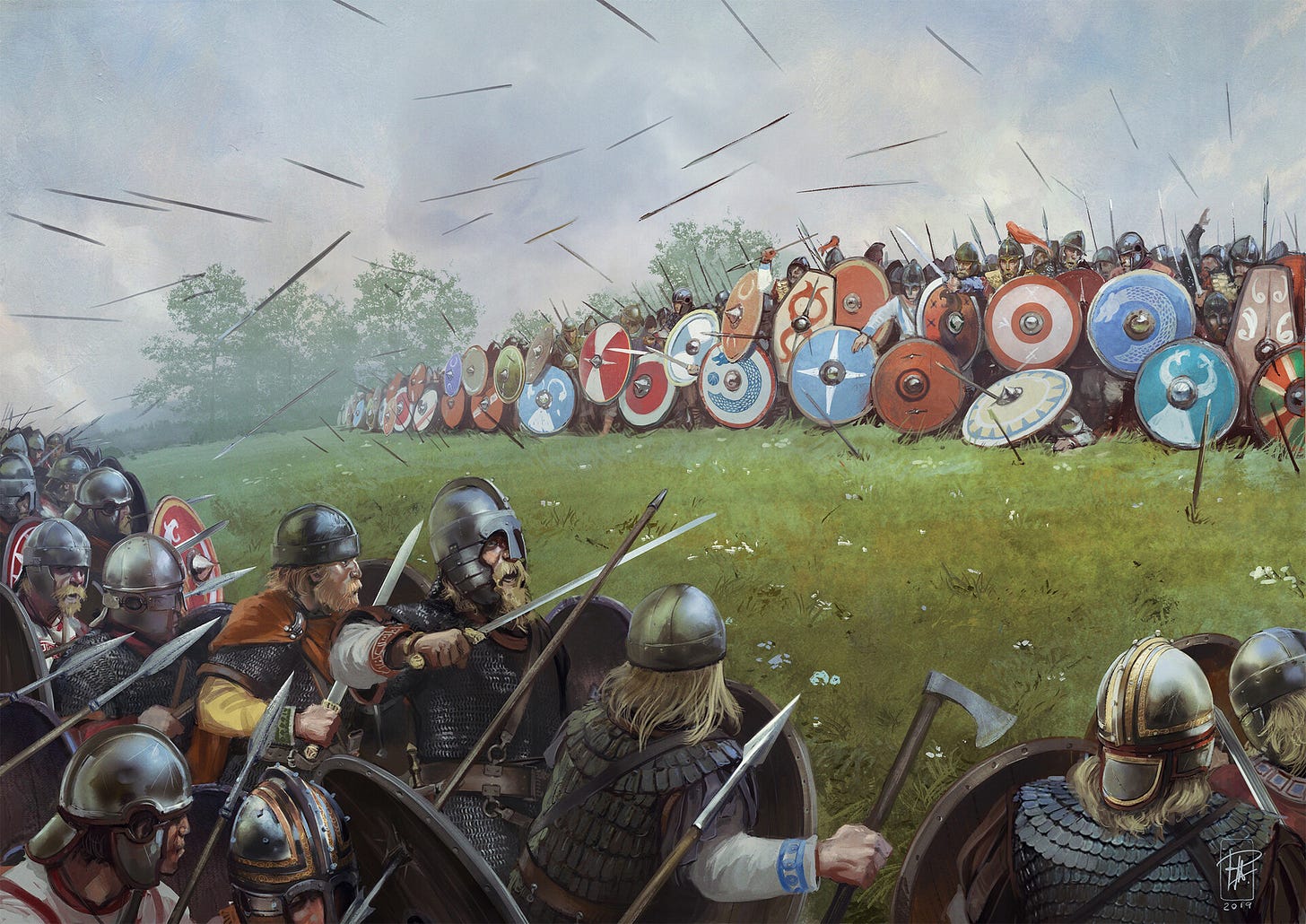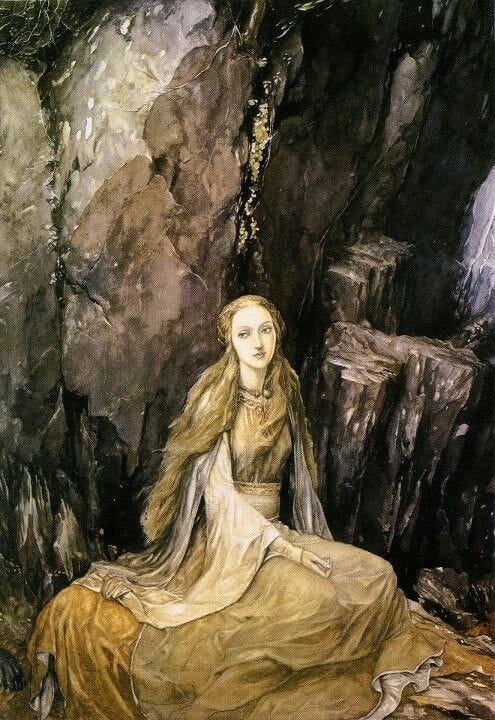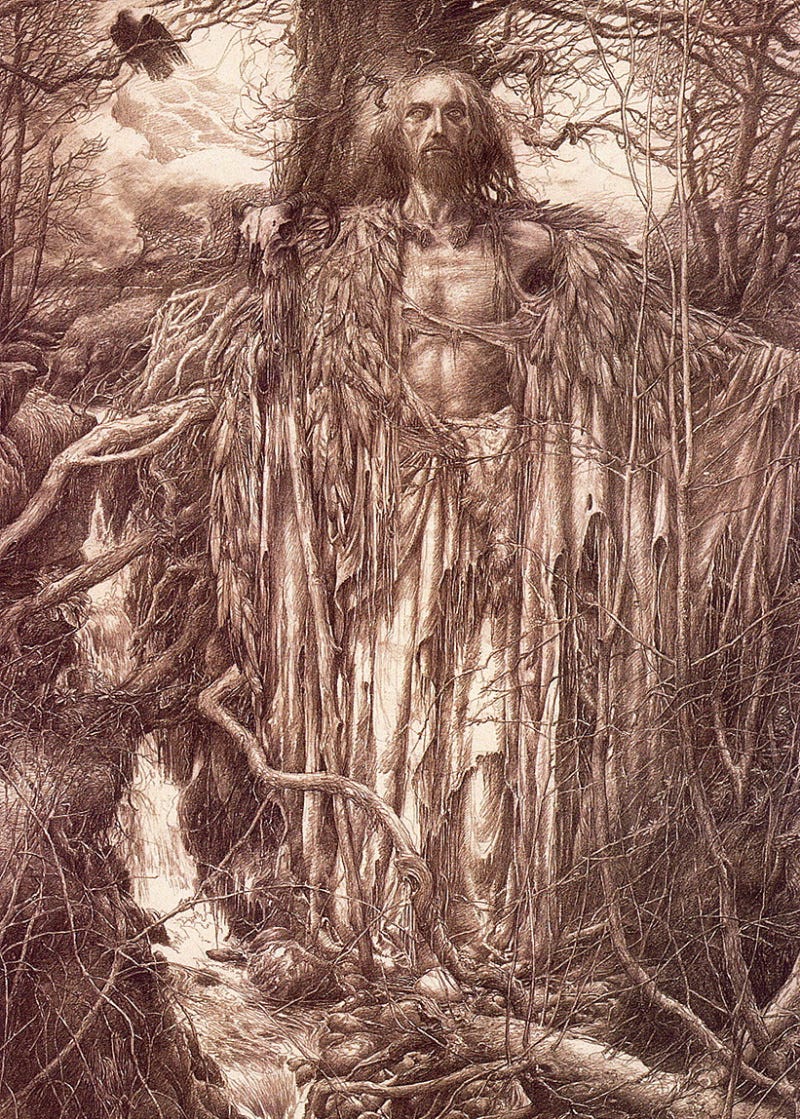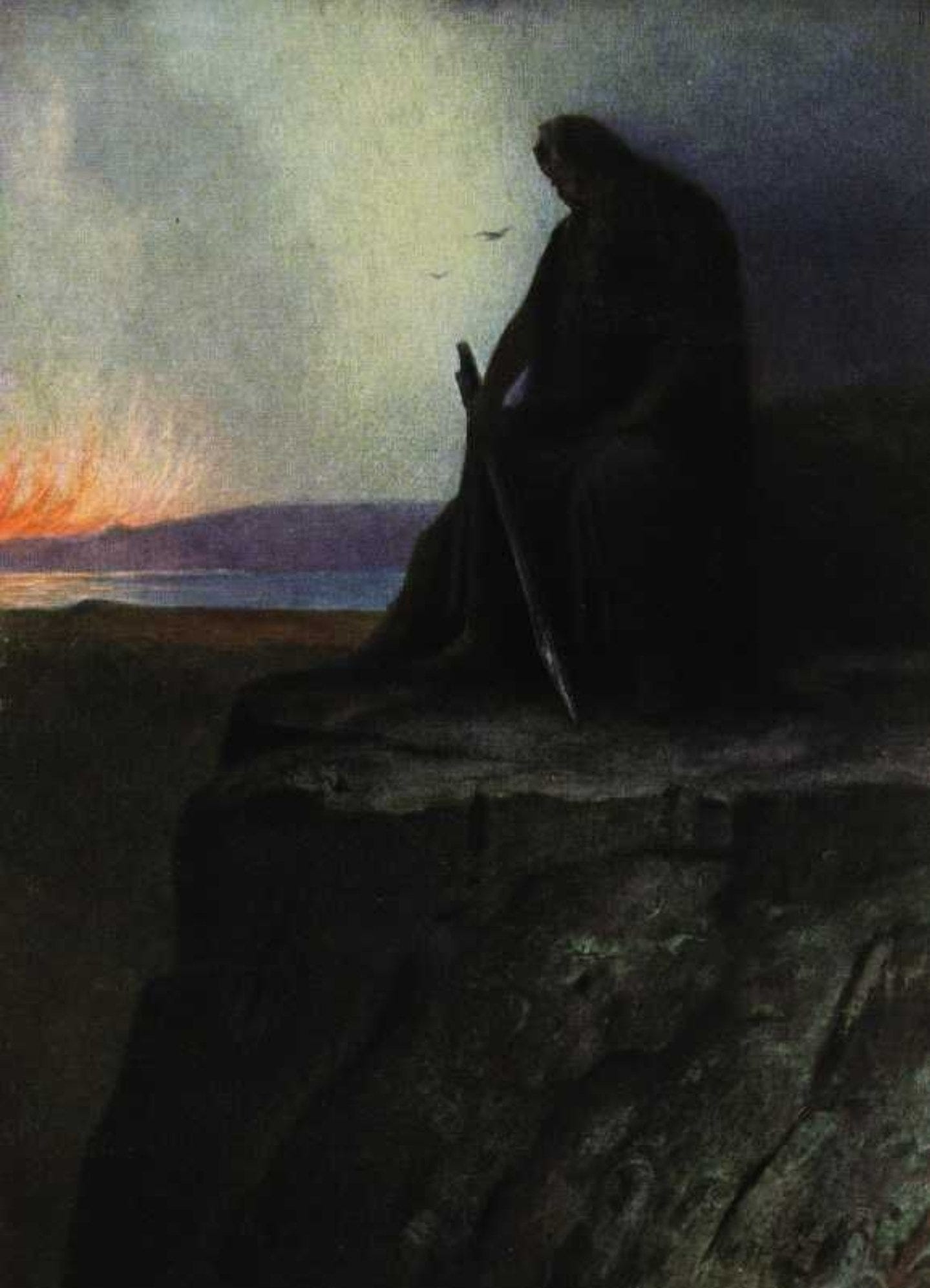The Brythonic Heroic Age: The Last Kings of Ebrauc
The Twin Kings Peredur and Gwrgi, and The Short-reigning Gwrgant Gwron ap Peredur.
Upon Arthuis ap Mar’s death in 537 his son Ellifer became king of Ebrauc. Ellifer is remembered as the leader of a powerful warband and was known as Ellifer Gosgorddfawr (Of the great army) because of this formidable warband, possibly the remnants of his father’s core retinue? Ellifer’s reign was relatively short and possibly ended as early as 547 (the year Ida was able to finally establish himself as king in Bryneich) or as late as 560. Tradition holds that his children were young when he died, and that the triplets (Peredur, Gwrgi, and Ceindrech (Arddun1) were raised by their mother, Efrddyl ferch Cynfarch2. It’s extremely likely then that Ida’s ascension was around the date of Ellifer’s death, and Peredur and Gwrgi were then probably born some time between 535-540. This is also in line with the most likely birth of Efrddyl. If she and Urien were twins she was probably born around 520. Ellifer himself would’ve been between 20 and 30 years her senior, and she may have even been a second wife, though I suspect Ellifer spent much of his young adulthood dealing with the day to day affairs of Ebrauc in his fathers stead3, and may have married fairly late. With Ellifer out of the way it may have been much easier for Ida then to establish his kingdom carving more territory from Bryneich, solidifying his Kingdom of Bernicia’s place. The Triplets would have been around seven years old at the time, which easily accounts for the tradition that they were young at their father’s death. Efrddyl then echoes the Widowed Lady of the Wasteland, the mother of the hero of the romance ‘Peredur son of Efrawg’.
Peredur and Gwrgi then jointly ruled Ebrauc (when they came of age) and there is basically nothing known about this early reign. There was still enough central power within the kingdom to keep the Angles of Deira and Bernicia at bay, so they must have still exercised a decent amount of influence in their early reign. The Annales Cambriae tells us that in 573 though, the brothers fought their cousin Gwenddoleu at Arfderydd (Arthuret)
573 The battle of Arfderydd between the sons of Eliffer and Gwenddolau son of Ceidio; in which battle Gwenddolau fell; Merlin went mad.
Arthuret is remembered in the Welsh Triads as one of the "Three Futile Battles of the Island of Britain", along with the Battle of Camlann and the Battle of the Trees, it seems that in addition to Peredur, Gwrgi, Gwenddoleu, and Myrddin (all cousins4) a number of armies from different kingdoms participated in the battle.
It chanced that the shepherds of Rhydderch and Aeddan aforesaied, by the instigation of the Devil, fell out for no other cause than a lark's nest; who, having beaten one another to the efussion of their blood, at last acquainted their lords of the whole strife, and they presently engaged themselves in the quarrel, entering into open hostility with such eagerness and hatred that having mustered their forces and committed some outrages, they appointed a day and place to try the matter by dint of sword; and Aeddan fearing to be too weak to encounter Rhydderch, drew to his side Gwenddoleu the son of Ceidiaw of the tribe of Coel Godeboc, a very powerful prince, and they, joining their forces, met Rhydderch at a place called Arderydd, where upon the first encounter Gwenddoleu was slain, and with him Llywelyn, Gwgawn, Einiawn, and Rhiwallawn, the sons of Morfryn, Merlin caledonius's bretheren; and in the end after a great slaughter on both sides, Rhydderch obtained the victory, and Aeddan fled the country.
From this story a list of the involved parties can be drawn, Áedán of the Dál Riatans (the year before he became king) Quarreling with a young Rhydderch Hael, King of Alt Clut, leading to Áedán going to Gwenddoleu for aid. Myrddin, the grandson of Arthuis ap Mar’s brother Morydd is also present, often described as Gwenddoleu’s bard or advisor. Peredur and Gwrgi are absent here, but that may have been intentional so as not to draw away from Rhydderch’s victory, as they are described as fighting against Gwenddoleu in multiple other sources. Sometimes Gwallog ap Lleenog is implied to have been present, with Dunod ap Pabo also being said to have been present.5
It is worth discussing a little bit about Gwenddoleu and his background I think. Gwenddoleu ruled from his seat at Caer Gwenddoleu (possibly Carwinley) north of Carlilse in his kingdon Caer Wenddoleu (possibly also called Arfderydd, although it’s name has been lost to time). He was probably born between 530-550 to Ceidio ap Arthuis, who had been set in place by his father Arthuis as a buffer between Alt Clut and Rheged. Ceidio and his brother Cynfelyn were both set up in similar border kingdoms, creating buffers between Alt Clut and Gododdin, two kingdoms that often caused trouble for the Coelings.6
Gwenddoleu was a powerful and rich king himself, remembered as owning one of the 13 Treasures of Britain, a golden gwyddbwyll board with silver game pieces that would play itself if the pieces were set. As a grandson of Arthuis ap Mar he may have commanded a significant force, inheriting much of the power his father Ceidio was entrusted with as a buffer against Alt Clut while his father lived. After the breakdown of Arthuis’ Northern High-kingship7 Ceidio would have retained the forces allocated to him from his father (most likely) as well as what personal retinue he could muster, with the remnants of these going to Gwenddoleu as well. Arfderydd is remembered as being a fairly large battle for the period, with Gwenddoleu’s warband alone remembered as one of the “Three Faithful War-Bands” numbering 2100 men, and that Gwenddoleu’s mounted rentinue caused a “battle-fog” (dust churned up by his numerous horsemen). While 2100 may be a stretch, a more conservative number of 300-600 may have been possible, and if the later account mentioned above attributing the battle to a quarrel between Rhydderch and Aedan is correct, as many as 2000-3000 men may have been present at the battle. Rhydderch was also considered a powerful and rich king, owning another of the 13 Treasures, Dyrnwyn, a magic sword with a blade that would flame from tip to hilt if held by a well-born man. Rhydderch is also implied to have been present through the poetry of Myrddin. Ellifer's sons (along with Rhydderch Hael) Slaughtered Gwenddoleu, his men, and Myrddin’s brothers, which drove Myrddin mad. He then fled into the Caledonian Forest, where he hides from Rhydderch’s men.
I slept alone in the woods of Celyddon,
Shield on shoulder, sword on…
Sweet appletree in the glade,
Trodden is the earth around its base.
The men of Rhydderch see me not
Gwendyyd no longer loves nor greets me
I am hated by Rhydderch's strongest scion…
Death visits them all - why not me?
After Gwnddoleu no one shall honour me,
No diversions attend me, No fair women visit me.
Though at Arderydd I wore a golden torque
The swan-white woman despises me now…
Appletrees - Myrddin
Peredur and Gwrgi disappear after the battle, until an entry in the Annales Cambriae for the year 580.
580 Gwrgi and Peredur sons of Elifert died
The Welsh Triads expand on this and tell where, and how the twin kings died. This triad is "The Three Faithless War-Bands of the Island of Britain"
The War-Band of Gwrgi and Peredur, who abandoned their lords at Caer Greu, when they had an appointment to fight the next day with Eda Great-Knee; and there they were both slain
This quite handily tells us that they were set for a pitched battle against Eda Great-Knee, but were abandoned by their warriors at Caer Greu. Eda Great-Knee poses a problem here, as it echoes both Ida of Bernicia, and his son Adda. The chronology that can be drawn for both of those men puts them nowhere near 580, with Ida only reigning until 560, and Adda only reigning until 568.
Ælle of the growing kingdom of Deira has been suggested as Eda as well, which would fit the timeline better, and he also is responsible for taking Ebrauc from Peredur's son Gwrgant after Caer Greu. Deira had grown in significantly over the last generation, likely a result of the weakening central power of rulers in the north at the time. Bolstered both by new Anglian settlement, and Brythonic people who saw no issue with a new Anglian ruler, Ælle’s kingdom annexed more and more territory. While Ælle seems a convenient choice, it doesn't explain Urien's seemingly retaliatory campaign during the 580s against Bernicia that ultimately led to his death at Lindisfarne.
The simple explanation could be that it was Adda and the timeline for the kings of Anglian Bernicia is wrong. Ida or Adda may have reigned significantly longer or later than the Historia Brittonum accounts for. With the massive amount of Sons that Ida had it's possible that this Eda is even one that we just don't have from other sources, or he may not have even been a king at all, but a leader of an Anglian Warband in Bernicia's service.
Another part of the puzzle is where Caer Greu actually is, and if it was in fact a literal placename or a poetic flourish from the triads. Caer Greu may mean something along the lines of "Fort of Blood" and could reference a battle at York itself. There are other suggestions that heavily rely on the name game, and sadly it's one of those things that we can't 100% place for sure, I find idea of it as a poetic name for York during this last battle the most compelling.
This brings back the idea that maybe it wasn't the Bernicians but instead Ælle of Deira, killing Peredur and Gwrgi, and driving Gwrgant away in the same battle, conquering the Kingdom of Ebrauc. Gwrgant is remembered in the Triads as one of the "Three Humbled Chieftains of Britain" with the epithet of Gwron, or Hero, seemingly implying that while he had lost lands, he was still seen favorably, maybe fighting a lost battle valiantly at York.
Some have proposed that Urien's wars against Bernicia were a campaign of retaliation for the death of his distant cousins Peredur and Gwrgi, with the eventual goal of retaking Ebrauc, it would seem that most evidence points to Deira being responsible though. There is always the possibility that Caer Greu was indeed another place, and that the battle met there was against Adda of Bernicia and that the chronologies are just mixed up, and that Caer Greu was a separate battle (in Bernicia?) from Ælle taking Ebrauc.
The big hitch here is the chronology for Peredur and Gwrgi. Older chronologies have them being born around 510, however that is working from an extremely early Floruit for Coel, their 3x great grandfather, which I find unrealistic, as I have discussed in other articles. It is more likely that they were born around 540, as discussed earlier in this article, and were around 40 at the time of their deaths. We also can't be 100% certain that the Annals dates are correct, although everything seems to align with Peredur and Gwrgi fighting at Arfderydd in 573 and dead at 580. The date for Arfderydd of 573 works well for floruits of all who are involved (Áedán mac Gabráin, Peredur and Gwrgi, Gwenddoleu, and Rhydderch Hael) so we can't place Peredur and Gwrgi before this, dying to Adda in 568 (the final year of his reign according to Nennius)
It seems unlikely that Arfderydd's date is wrong, so we have to assume that either Historia Brittonum's date is wrong, and Adda reigned later, or it was Ælle of Deira all along. Considering Urien’s brutal campaign almost wiping Bernicia completely out, driving them all the way back to Lindisfarne, the abandonment of their warband (Would a warband under siege in their own city leave their families behind?) indicating that Caer Greu and Ebrauc are not the same, and the unsteady dates of Ida’s son's succession, it definitely seems likely that Adda’s dates are wrong, or that it was another Eda adjacent figure associated with Bernicia, possibly an otherwise unmentioned son.
With Peredur and Gwrgi’s death and Gwrgant’s exile, Arthuis’ kingdom of Ebrauc finally falls, 43 years after his death.
You can read about the possible erroneous attribution of Arthur as Uther’s son in this article. Ellifer is called Elutherius or Eluther, and Arddun/Ceindrech is called Arthur in one translation possibly leading to the confusion.
Cynfarch Oer, son of Meirchion Gul and cousin of Arthuis. She was supposedly the twin of Urien.
Arthuis as a high-king figure is discussed in these two articles. Highly likely he was busy with the responsibilities that entailed, and Ellifer ruled Ebrauc in the day to day. This may be reflected in the Archgallo story with Elutherius ruling in his deposed ‘brother’ Archgallo’s stead.
Gwenddoleu is the son of Ceidio ap Arthuis, Peredur and Gwrgi are sons of Ellifer ap Arthuis, and Myrddin (Merlin) is the son of Madog Morfryn ap Morydd (Morydd is the brother of Arthuis)
Both also cousins of Gwenddoleu, Peredur and Gwrgi, Leenog being Arthuis brother and Pabo being Arthuis’ uncle.
Ceidio and Cynfelyn’s kingdoms both seem to have been set up specifically as buffers during their father’s late reign.










I've set up my substack but being a tech divvy I don't know how to message you about it on here